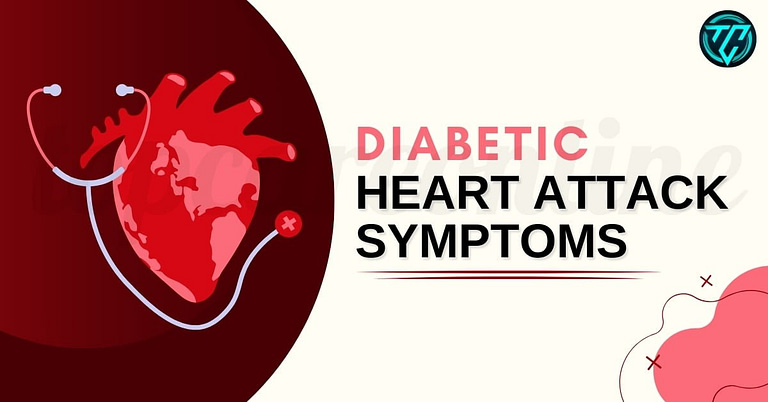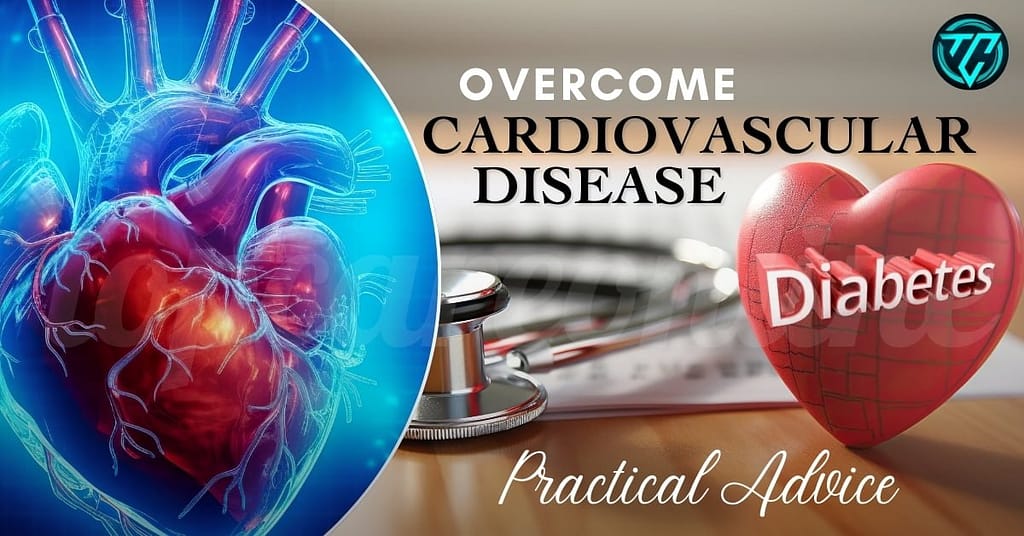Diabetes and heart disease are two serious health conditions that often intersect, complicating diagnosis and treatment. For individuals recognizing the Diabetic heart attack symptoms can be particularly challenging.
This comprehensive guide aims to shed light on the often-overlooked signs of a heart attack in diabetics, the reasons behind silent heart attacks, and actionable steps to safeguard heart health.
What is Heart Attack?
A heart attack, or myocardial infarction, occurs when blood flow to a part of the heart muscle is blocked for a long enough time that part of the heart muscle is damaged or dies. This usually happens because of a blockage in one or more coronary arteries, which supply blood to the heart. The blockage is often caused by a buildup of fatty deposits (plaque) that can rupture and form a blood clot, obstructing blood flow.
Why Diabetics Causes Increased Heart Attack Risks?
Diabetes significantly increases the risk of heart disease due to several factors. High blood sugar levels can lead to the buildup of fatty deposits in the arteries (atherosclerosis), which restrict blood flow to the heart. This condition not only elevates the risk of a heart attack but also often accelerates the progression of heart disease.
Additionally, individuals with diabetes frequently experience high blood pressure and high cholesterol, further exacerbating heart disease risks. The cumulative effect of these factors makes it imperative for diabetics to be vigilant about heart health.
Some Diabetic Heart Attack Symptoms
For many, heart attack symptoms are widely recognized and include:
- Chest Pain or Discomfort: Often described as pressure, squeezing, or fullness in the center of the chest.
- Shortness of Breath: Accompanied by chest discomfort or occurring alone.
- Pain in Other Areas: Discomfort in one or both arms, back, neck, jaw, or stomach.
- Nausea, Lightheadedness, or Cold Sweat: These symptoms might accompany the chest pain.
What is Silent Heart Attack in Diabetics?
A silent heart attack is a heart attack that occurs without the typical symptoms or with very mild symptoms that may go unnoticed. This can be particularly common in people with diabetes. In diabetics, nerve damage caused by high blood sugar levels (diabetic neuropathy) can dull the sensation of pain, making it harder to recognize the signs of a heart attack.
Why Do Diabetics Get Silent Heart Attacks?
Silent heart attacks in diabetics occur due to several factors:
- Nerve Damage: Diabetes can lead to diabetic neuropathy, which impairs the ability to feel pain and other sensations.
- Altered Pain Perception: High blood sugar levels can alter how pain is perceived, making symptoms less noticeable.
- Chronic Inflammation: Diabetics often experience chronic inflammation, which can mask or alter typical heart attack symptoms.
What Are the Symptoms of a Silent Heart Attack in Diabetics?
Silent heart attacks are particularly challenging as they don’t always present with the classic symptoms. But some symptoms may include:
- Unexplained Fatigue: Feeling unusually tired without a clear reason.
- Mild Discomfort or Pressure: In the chest or other areas, often mistaken for indigestion or muscle pain.
- Shortness of Breath: Occurs suddenly or without a clear cause.
- Unusual Sweating: Not linked to physical exertion or external heat.
- Nausea: Often vague and not accompanied by other gastrointestinal symptoms.
How to Monitor and Manage Heart Health
Regular Check-Ups
Routine medical check-ups are crucial for monitoring heart health. Regular blood tests, blood pressure checks, and cholesterol screenings can help detect risk factors early.
Lifestyle Modifications
- Diet: Adopting a heart-healthy diet rich in fruits, vegetables, lean proteins, and whole grains can help manage blood sugar and reduce heart disease risk.
- Exercise: Regular physical activity helps control blood sugar levels, maintain a healthy weight, and improve overall cardiovascular health.
- Stress Management: Stress can negatively impact heart health. Practices such as meditation, yoga, and adequate sleep are beneficial.
Medication Adherence
For those prescribed medications for diabetes or heart disease, adherence is crucial. Medications can help control blood sugar levels and manage other risk factors, such as high blood pressure and cholesterol.
Taking Action: What to Do If You Suspect a Heart Attack
If you or someone with diabetes suspects Diabetic heart attack symptoms, seek immediate medical attention. Quick response can significantly impact outcomes and recovery. Call emergency services right away, and while waiting for help, try to remain calm and avoid physical exertion.
Encouragement for Action
Don’t wait for symptoms to appear. Schedule a check-up with your healthcare provider today, discuss your heart health, and take proactive steps to manage diabetes and heart disease effectively. Your health is your most valuable asset—protect it with knowledge and action.


